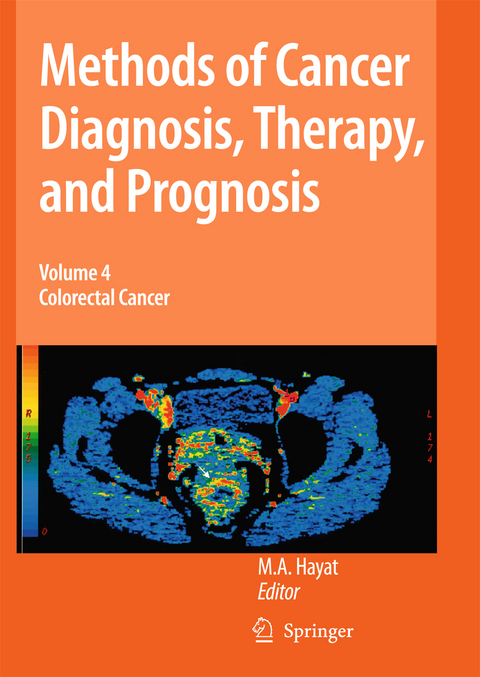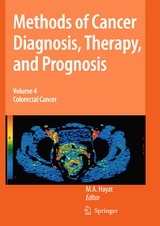Methods of Cancer Diagnosis, Therapy and Prognosis
Springer-Verlag New York Inc.
978-1-4020-9544-3 (ISBN)
This volume discusses various methodolo- discoveries and their translation to clinical gies for the diagnosis, therapy, and prog- practice. Oncology will benefit the most nosis of colorectal cancer (CRC). Volumes from these various advanced methodologies, 1, 2, 3, and 4 of this series present similar as a combination of the rapies and person- methods for breast cancer, lung and pros- ized medicine will improve early detection tate cancers, and gastrointestinal cancer, of CRC and other cancer types. respectively. The current volume presents The use of anticancer agents, including surgical, radiological, and molecular thera- 5-fluorouracil, fluoropyrimidines, leuc- pies and prognostic biomarkers for CRC. orin, irinotecan, oxaliplatin, raltitrexed, A large number of methods, including capecitabine, cetuximab, and bevacizumab, immunohistochemistry, in situ hybridiza- is also presented. Preoperative chemora- tion, immunoscintigraphy, RT-PCR, free otherapy is compared with postoperative circulating DNA levels in blood and stool, chemoradiotherapy.
In addition, treatments ultrasonography, CT, PET, and MRI are such as immunotherapy, laparoscopic detailed for diagnosing CRC at various surgery, radiofrequency ablation, pho- stages of development. Imaging technolo- dynamic therapy, and preoperative che- gies for assessing the treatment results are radiotherapy, are presented. Preoperative also included as are details related to colon- short-course radiation for resectable r- oscopy and sigmoidoscopy. In addition, the tal cancer is also detailed. role of mircoRNA as a biomarker for this This volume included the efforts of 89 type of cancer is elaborated.
Colorectal Cancer.- Introduction: Colorectal Cancer.- Poorly Differentiated Colorectal Adenocarcinoma (Methodology).- Colorectal Cancer: Immunohistochemical Diagnosis with Heterogeneous Nuclear Ribonucleoprotein K.- Metastases and Recurrence of Colorectal Cancer: Diagnostic Role of Immunoscintigraphy.- Colorectal Cancer Diagnosis Using DNA Levels in Blood and Stool.- Colorectal Carcinoma: Identification of MicroRNAs Using Real-Time Polymerase Chain Reaction.- Colorectal Cancer: Optimization of the Combination of 5-Fluorouracil and Irinotecan.- Detection of Abdominal Abscesses After Colorectal Surgery: Ultrasonography, Computed Tomography and Gallium Scan.- Antimetastatic Therapy in Colorectal Cancer: Role of Tumor Cell Matrix Metalloproteinase 9 (Methodology).- Endoscopic Resection of Early Colorectal Tumors: Novel Diagnostic and Therapeutic Techniques.- Role of Stromal Variables in Development and Progression of Colorectal Cancer.- Quantitative Assessment of Colorectal Cancer Perfusion: Perfusion Computed Tomography and Dynamic Contrast Enhanced Magnetic Resonance Imaging.- Positron Emission Tomography and Colorectal Cancer.- Prognostic Significance of Protein Markers in Colorectal Cancer Stratified by Mismatch Repair Status.- Colorectal Cancer: Lactate Dehydrogenase (LDH) Activity as a Prognostic Marker.- Colon Cancer.- Detection of Tumor Cells in Lymph Nodes of Colon Cancer Patients Using Real-Time Quantitative Reverse Transcription-Polymerase Chain Reaction.- Colon Cancer: Laparoscopic Surgery.- Sentinel Node-Based Immunotherapy of Colon Cancer.- Rectal Cancer.- Rectal Cancer: Preoperative Staging Using Endorectal Ultrasonography (Methodology).- Rectal Cancer: Spectral Imaging and Immunohistochemistry of Thymidylate Synthase.- Cancer of the Rectum: Abdominoperinealand Sphincter-Saving Resections.- Chemoradiation for Rectal Cancer.- Resectable Rectal Cancer: Preoperative Short-Course Radiation.- Preoperative Chemoradiotherapy Allows for Local Control in Rectal Cancer – But Distant Metastases Remain an Unsolved Problem.- Locally Advanced Rectal Cancer: Combined Chemotherapy During Preoperative Radiation Therapy.- Colorectal Liver Metastases.- Colorectal Cancer Liver Metastases: Neoadjuvant Therapy with Bevacizumab.- Colorectal Liver Metastases: Radiofrequency Ablation.- Anal Cancer.- Anal Squamous Cell Carcinomas: Diagnosis Using p63 Immunohistochemistry.- Molecular and Clinicopathologic Features Which Predict Outcome in Patients with Anorectal Melanoma.
| Erscheint lt. Verlag | 14.4.2009 |
|---|---|
| Reihe/Serie | Methods of Cancer Diagnosis, Therapy and Prognosis ; 4 |
| Zusatzinfo | XXXVIII, 503 p. |
| Verlagsort | New York, NY |
| Sprache | englisch |
| Maße | 203 x 276 mm |
| Themenwelt | Medizin / Pharmazie ► Medizinische Fachgebiete ► Chirurgie |
| Medizin / Pharmazie ► Medizinische Fachgebiete ► Onkologie | |
| Medizin / Pharmazie ► Medizinische Fachgebiete ► Radiologie / Bildgebende Verfahren | |
| Medizin / Pharmazie ► Pflege | |
| Medizin / Pharmazie ► Studium | |
| ISBN-10 | 1-4020-9544-9 / 1402095449 |
| ISBN-13 | 978-1-4020-9544-3 / 9781402095443 |
| Zustand | Neuware |
| Haben Sie eine Frage zum Produkt? |
aus dem Bereich




